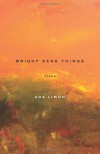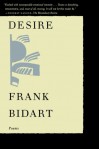Seanachie: A Boston Irish Storyteller and Part-Time Shaman
Books about place, magic, Faeries, Ireland, sex, God, and love
Currently reading
Atrocity Porn

It’s not a spoiler to say this novel ends with a stirring and poetic image: voices in 35 languages singing the word home in a harmonious chorus. The remainder of the novel, however, is a series of harrowing and dismal accounts of human cruelty, many of them with origins in the conflicts in the various Balkan states. These accounts, rendered by characters with distinct voices, lost their distinction over the course of the novel by virtue of their repetition and eventually blend into one long painful numbing tale. Moreover, they seem to serve no narrative purpose -- a kind of atrocity porn.
The novel starts off well enough: a articulate and handsome stranger named Vlad appears suddenly in a small Irish town proposing to open shop as a sex therapist until the local priest and bishop persuade him to proclaim himself a healer instead. One of the local married women fall for him and becomes pregnant. The remainder of the town is equally smitten until a few strange occurrences make them begin to suspect the stranger is not who he says he is. When his identity is uncovered, there is an episode of violence that triggers the avalanche of accounts of atrocities that make up the remainder of the novel.
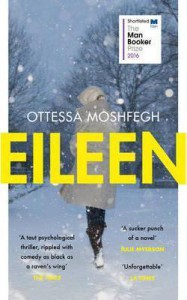
David Sedaris is pitching this disturbing novel on his book tour and reports he was tipped to it by John Waters, so I absolutely had to check it out, particularly after Sedaris read a particularly distressing account of a lengthy and troubling bowel movement punctuated with the line: "This was the best of times."
And the recommendations from these two twisted masterminds Sedaris and Waters makes perfect sense. This is a colossally honest, brutal, slightly kinky book narrated by a woman growing up somewhere smalltown and distant and perhaps 1960s vintage who has a massive but inexperienced erotic imagination. Most of the time, she is relating the particulars of her narrow experience spent between a home life with an almost comically alcoholic father and her day job at a prison for boys. But there is a point in this novel where a mere two sentences change this novel from a commentary of smalltown manners to something real and explosive that takes the breath away.
The weakness of the book is that it is narrated from a perspective fifty years hence, and the distance is a bit chilling and leaves a large unsatisfying void (which, perhaps, the author will fill with a sequel, since the narrator hints at continued crazy adventures in the years inbetween the events and the narration).
Fingersmith
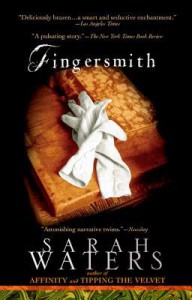 To call Fingersmith a lesbian love story is a disservice on many levels. Never mind that the novel is full of titillation (pun intended): there is hot lesbian reasonably graphic passion; a disturbing lesbian gang rape scene; hate-fueled love rants; and plenty of murder. But this is far more than a love story and (for the straight squeamish) the lesbian element is almost beside the point: it is ultimately a novel of crime and resentment and making deals with oneself. It is a novel of class. It entails a patient development of plot, and yet has two narrators who cover precisely the same territory, but somehow tell two entirely different stories. Waters manages to deploy minor characters to great effect: apparent throwaways become important at subsequent times. (I tried not to take offense that the primary villain is a gay man.)
To call Fingersmith a lesbian love story is a disservice on many levels. Never mind that the novel is full of titillation (pun intended): there is hot lesbian reasonably graphic passion; a disturbing lesbian gang rape scene; hate-fueled love rants; and plenty of murder. But this is far more than a love story and (for the straight squeamish) the lesbian element is almost beside the point: it is ultimately a novel of crime and resentment and making deals with oneself. It is a novel of class. It entails a patient development of plot, and yet has two narrators who cover precisely the same territory, but somehow tell two entirely different stories. Waters manages to deploy minor characters to great effect: apparent throwaways become important at subsequent times. (I tried not to take offense that the primary villain is a gay man.) In a nutshell, the story spans generations. A mother of the gentry arrives at the doorstep of a baby-marketing, fencing household in the darker neighborhoods of mid-19th century London. She gives birth, only to have her family track her down. Making a deal with the proprietor of the household, the mother causes her child (Susan) to be raised among the thieves and the child of the thieves (Maud) to be taken away to be raised among the gentry. Years later, in search of fortune, Susan is dispatched to trick Maud into yielding her fortune by marrying her to the gay rascal "Gentleman" aka Richard Rivers. What Susan doesn't realize is that Maud has her own trickery afoot. What follows is a ride through dark country nights and criminal clergy, madhouses and evil doctors. The tables turned on her, Susan is locked away, while the lady Maud, raised among gentry, takes Susan's place on London's streets. Hatred alone can't keep Maud and Susan apart, but it takes a murder to truly bring them together.
The French Quarter: An Informal History of the New Orleans Underworld
 This is a breezy, well-written, non-academic history of the French Quarter and New Orleans generally -- literary equivalent perhaps to the best of the city's tourist tours. It is full of charming and outrageous anecdotes of all kinds and colorful characters from madames to politicians to thugs. Due to its age, there are a few politically incorrect musings, but overall the text comes across as relatively modern--particularly in the treatment of the wily and thuggish women/madames.
This is a breezy, well-written, non-academic history of the French Quarter and New Orleans generally -- literary equivalent perhaps to the best of the city's tourist tours. It is full of charming and outrageous anecdotes of all kinds and colorful characters from madames to politicians to thugs. Due to its age, there are a few politically incorrect musings, but overall the text comes across as relatively modern--particularly in the treatment of the wily and thuggish women/madames.Needless perhaps to say, the focus is virtually entirely on the seedy side of the Quarter. Far less time (none?) is given to positive portrayals or to music or the influences of French and Spanish culture or to any serious investigation of voodoo and its Catholic influences. Hence, you get what you paid for -- a little titillation, a few laughs, some outrage--and a desire to check out the tour and have a cocktail.
Garden Time
 This slim volume of Merwin's work contains certain gems. I was struck by "The Sound of It," a poem lamenting (or maybe just remarking) on the fact that the stopping of a dog's bark or a day's rain is not itself heard, but rather only the silence or what replaces it, or what was always there that the bark or rain caused us not to attend. Also by the ultimate poem, "The Present," in which two leaving the garden nevertheless simultaneously reach for a senseless gift neither can keep, but laugh when their hands strike each other while so reaching.
This slim volume of Merwin's work contains certain gems. I was struck by "The Sound of It," a poem lamenting (or maybe just remarking) on the fact that the stopping of a dog's bark or a day's rain is not itself heard, but rather only the silence or what replaces it, or what was always there that the bark or rain caused us not to attend. Also by the ultimate poem, "The Present," in which two leaving the garden nevertheless simultaneously reach for a senseless gift neither can keep, but laugh when their hands strike each other while so reaching.That said, the poems in the second half of the book devolved into a murkiness, in which Merwin largely lost the power of the specific and tangible image and instead noodles in a kind of haze thanking his lucky stars for his late-in-life love or remarking with wonder on his old age. Neither the love nor his old age are presented vividly, so the effect is largely maudlin.
Christodora: A Novel
 This is an epic history of some of the residents of an East Village building known as the Christadora superimposed on some of the historical events that constituted the American reaction (or, in the case of the government, lack thereof) to the HIV/AIDS crisis. Its non-linear narrative jumps around from various time frames from the 80s through 2021 and it is narrated by at least half a dozen distinct characters.
This is an epic history of some of the residents of an East Village building known as the Christadora superimposed on some of the historical events that constituted the American reaction (or, in the case of the government, lack thereof) to the HIV/AIDS crisis. Its non-linear narrative jumps around from various time frames from the 80s through 2021 and it is narrated by at least half a dozen distinct characters.Murphy does an outstanding job slow-building empathy for the characters, many of whom are bundles of bad choices resulting in terrible consequences. Central to the story is a pair of (secular) Jewish East Village artists married to one another who adopt the child of a Latina AIDS activist, who dies from complications arising from HIV/AIDS. The child proves to be an artist in his own right, but in his teenage years rebels against his parents and ultimate becomes a heroin addict--destroying many lives on the way. This child's finding his way as an adult to a kind of redemption and amends-making -- however incomplete -- is the main thrust of the story.
If Murphy's novel suffers from a defect, it is that some of the storytelling seems to have been shaped to fit the HIV/AIDS history, instead of growing organically from the characters. For the most part, though, these maddening characters manage to carry the narrative forward, and Murphy does not fall prey to the need to wrap up all the loose ends.
Over Nine Waves: A Book of Irish Legends
 This is a delightful modern but faithful retelling of the main legends of Irish literature. Heaney has a breezy, action-driven approach to the tales that still has a certain emotional resonance (often involving wounded pride). Madness, vengeance, sorrow, teamwork, courage abound, as well as some wonderful descriptions of beauty and Ireland and Tir Na nOg. The Tuatha de Danaan, the Children of Lir, Cuchulainn, and the Fianna are all included here. There is perhaps less focus on certain characters (e.g., Maebh). The tales of Saints Patrick, Brigid, and Columcille that are the last three sections of this book seemed a bit out of place compared to the largely pre-Christian material with which they are grouped. Had I been editor, I would have excluded them--not least of which because, other than Patrick's, the lives described don't have a lot of narrative oomph.
This is a delightful modern but faithful retelling of the main legends of Irish literature. Heaney has a breezy, action-driven approach to the tales that still has a certain emotional resonance (often involving wounded pride). Madness, vengeance, sorrow, teamwork, courage abound, as well as some wonderful descriptions of beauty and Ireland and Tir Na nOg. The Tuatha de Danaan, the Children of Lir, Cuchulainn, and the Fianna are all included here. There is perhaps less focus on certain characters (e.g., Maebh). The tales of Saints Patrick, Brigid, and Columcille that are the last three sections of this book seemed a bit out of place compared to the largely pre-Christian material with which they are grouped. Had I been editor, I would have excluded them--not least of which because, other than Patrick's, the lives described don't have a lot of narrative oomph.
Do Not Say We Have Nothing
 This Booker prize short listed novel is a story of fragments and shards, stops and starts, texts and copies, mathematics and unfinished symphonies and words with dual meanings. Ostensibly, this is the tale of several related families set in and around the cultural revolution in China, but also springing forward to Tiananmen Square in 1989 and Canada in the early 90s. It describes the struggles in particular of Sparrow, a talented composer, who--in order to preserve his family--destroys his own work and is put to laboring in a factory (and dreaming of a perfect silence). It also describes his lover-in-all-but-physical-deed Kai, who has a “purer” peasant family history and a quicker turn to the Red Guard and thus prospers as a musician in Beijing despite the revolution, yet loses his soul.
This Booker prize short listed novel is a story of fragments and shards, stops and starts, texts and copies, mathematics and unfinished symphonies and words with dual meanings. Ostensibly, this is the tale of several related families set in and around the cultural revolution in China, but also springing forward to Tiananmen Square in 1989 and Canada in the early 90s. It describes the struggles in particular of Sparrow, a talented composer, who--in order to preserve his family--destroys his own work and is put to laboring in a factory (and dreaming of a perfect silence). It also describes his lover-in-all-but-physical-deed Kai, who has a “purer” peasant family history and a quicker turn to the Red Guard and thus prospers as a musician in Beijing despite the revolution, yet loses his soul.In some ways, Thien's writing is unconventional with quick shifts of point of view. In others, it is quite conventional, and symbols hit you on the head like cartoon anvils. However, the novel grew on me, as the restrained passions (even at times passivity) of the characters acquired over time a narrative momentum and quiet emotional charge. Terror, denunciations, humiliations, beatings, false confessions, disappearances, vicious mobs, and wasted lives are part and parcel of this novel, so it is no easy read, but there are survivors and there are heroes and a host of well-drawn secondary characters.
The Halo
 This is a powerful collection of poems based on the image of a boy-angel all too human and blessed with wings. Confounding the presentation is an accident in which the poems' narrator was nearly killed by a drunk driver and "lost days"--as well a a certain innocence. Young depicts a dazzling array of emotion: secret pride, deep shame, self-destructive anger, and a fascination with human form. The halo is both the Neck brace post-accident as well as the angelic halo befitting a man with wings, an almost angel, almost god. Searing imagery permeates throughout and Young never loses control or lets his imagery stray from focus on angels and wings and difference. Magnificent short collection and extra kudos for the many Boston references!
This is a powerful collection of poems based on the image of a boy-angel all too human and blessed with wings. Confounding the presentation is an accident in which the poems' narrator was nearly killed by a drunk driver and "lost days"--as well a a certain innocence. Young depicts a dazzling array of emotion: secret pride, deep shame, self-destructive anger, and a fascination with human form. The halo is both the Neck brace post-accident as well as the angelic halo befitting a man with wings, an almost angel, almost god. Searing imagery permeates throughout and Young never loses control or lets his imagery stray from focus on angels and wings and difference. Magnificent short collection and extra kudos for the many Boston references!
Middle Earth: Poems
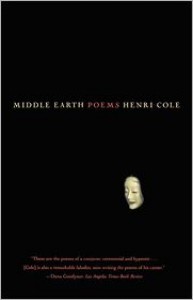 Henri Cole has collected here a set of poems that I am alternately dawn to describe as either very subtle or very timid. In the background lurks reference to flesh and sex that never quite materializes in the poetry. It’s the opposite of what I would call visceral. Not quite sure what to do with these or what he intended; despite the occasional flash of an enduring image, the collection as a whole always falls short of that (in the words of the immortal Donald Trump) pussy-grabbing moment. That said, I was intrigued enough to read more.
Henri Cole has collected here a set of poems that I am alternately dawn to describe as either very subtle or very timid. In the background lurks reference to flesh and sex that never quite materializes in the poetry. It’s the opposite of what I would call visceral. Not quite sure what to do with these or what he intended; despite the occasional flash of an enduring image, the collection as a whole always falls short of that (in the words of the immortal Donald Trump) pussy-grabbing moment. That said, I was intrigued enough to read more.The Wonder
 This new novel by the author of “Room” is an entirely different take on what it means to be trapped and to be rescued. It is set in rural post-famine Ireland in the late 1850s. An English nurse trained under Florence Nightingale during the Crimean War is dispatched to a small town, where an eleven-year-old girl is said to be experiencing a miracle: she has not eaten a morsel of food since in the four months since her eleventh birthday and is subsiding on manna from Heaven alone. By order of a local commission of officials, including the local priest, the nurse and a middle-aged Sister of Mercy take on the task of keeping 24-hour watch over the girl to prove that the girl is truly a miracle ... or that she is a fraud.
This new novel by the author of “Room” is an entirely different take on what it means to be trapped and to be rescued. It is set in rural post-famine Ireland in the late 1850s. An English nurse trained under Florence Nightingale during the Crimean War is dispatched to a small town, where an eleven-year-old girl is said to be experiencing a miracle: she has not eaten a morsel of food since in the four months since her eleventh birthday and is subsiding on manna from Heaven alone. By order of a local commission of officials, including the local priest, the nurse and a middle-aged Sister of Mercy take on the task of keeping 24-hour watch over the girl to prove that the girl is truly a miracle ... or that she is a fraud.“The Wonder” is an intimate book, focusing on the experience of Lib, the Nightengale nurse, a born skeptic and adherent of science. Her skepticism is caustic and derisive. She imagines that she will uncover the fraud in her first shift. In fact, a week passes without any sign of fraud -- but a clear deterioration in the girl’s health. Ultimately, Lib sees the watch itself as a peril to the girl’s survival.
The girl at the heart of this book is a lovely, pious, and intelligent character, albeit guilt-ridden and stubborn in the extreme. The villagers that surround her are fervently Catholic and allow their thirst for a miracle to overwhelm their love for the girl.
Lib, on the other hand, is not particularly likeable, and that is the particular flaw of the novel. She is unsympathetic, brusque, argumentative, superior, dismissive, anti-Irish and -Catholic, and bumbling -- if very, very smart and very very lonely. When she ultimately attempts her escape from her predicament, the reader is not actually rooting for her success, but rather hopes she ends up in jail. This does not appear to be what Donoghue intended.
Beautiful Crescent: A History of New Orleans
 This is a book that doesn't quite know what it wants to be: there are notes in it as if it is academic, but it's not a particular rigorous read nor does it take any point of view. It begins as a historical and chronological narrative but shifts gears midstream and turns to a topical approach that quickly leaps centuries and back again. Toward the end, it becomes a tourist guide book (There's a brief chapter called "Directions in New Orleans") and then a compilation of lists ("noted personalities" and "statues and monuments" and "hurricanes") that are of dubious use or interest and without context. In addition, there are some cringeworthy passages in which Widmer appears to suggest the lives of the slaves or New Orleans were ok because they were allowed to gather in dances, and they were fed, and they could hire themselves out for pay. On a basis relative to the rest of the South, that may well be true, but Widmer's patronizing tone made it sound as if the slaves were not only lucky but happy-go-lucky in their bondage. In addition, Widmer makes a half-hearted attempt to rescue the reputation of General Butler, the Civil War occupier, but her argument is not particularly persuasive and has been made better by others.
This is a book that doesn't quite know what it wants to be: there are notes in it as if it is academic, but it's not a particular rigorous read nor does it take any point of view. It begins as a historical and chronological narrative but shifts gears midstream and turns to a topical approach that quickly leaps centuries and back again. Toward the end, it becomes a tourist guide book (There's a brief chapter called "Directions in New Orleans") and then a compilation of lists ("noted personalities" and "statues and monuments" and "hurricanes") that are of dubious use or interest and without context. In addition, there are some cringeworthy passages in which Widmer appears to suggest the lives of the slaves or New Orleans were ok because they were allowed to gather in dances, and they were fed, and they could hire themselves out for pay. On a basis relative to the rest of the South, that may well be true, but Widmer's patronizing tone made it sound as if the slaves were not only lucky but happy-go-lucky in their bondage. In addition, Widmer makes a half-hearted attempt to rescue the reputation of General Butler, the Civil War occupier, but her argument is not particularly persuasive and has been made better by others. That said, Beautiful Cresent is not without virtue. Widmer unearths some wonderful historical tidbits (the famous whore called "La Sans Regret") and her writing is breezy and workmanlike, if not particularly poetic. Notwithstanding its pretensions to academic scholarship, this is a fair high-level overview, at least until it devolves into tour guide and book of lists.
Call of Cthulhu and Other Stories
 Classic short collection of Lovecraft with excellent narration (save for some of the odd accents purportedly from New England). Full of the usual horrors and ghastliness and madness driven by fear and doomed narrators and ancient hieroglyphics and wacky unworldly geometry. Good Halloween reading.
Classic short collection of Lovecraft with excellent narration (save for some of the odd accents purportedly from New England). Full of the usual horrors and ghastliness and madness driven by fear and doomed narrators and ancient hieroglyphics and wacky unworldly geometry. Good Halloween reading.
Here I Am
 This is a complicated novel about being present. It simultaneously explores the difficult relationships Jews have with themselves (and their Israeli-ness and/or American-ness) as well as the diffident relationship the main character has with his ailing dog. In the backdrop is a cataclysmic earthquake that rocks the Middle East and culminates in yet another war to destroy Israel -- and a call to all Jews worldwide to come to her aid.
This is a complicated novel about being present. It simultaneously explores the difficult relationships Jews have with themselves (and their Israeli-ness and/or American-ness) as well as the diffident relationship the main character has with his ailing dog. In the backdrop is a cataclysmic earthquake that rocks the Middle East and culminates in yet another war to destroy Israel -- and a call to all Jews worldwide to come to her aid.The first half of the novel is mostly chronological; the second half is scattershot, leaping years and returning in a matter of sentences, and punctuated throughout by headings that interrupt us (even mid-Torah portion!). Throughout is a common set of questions: Am I doing the right thing? Why is this happening? How do I respond? Though Jacob, the main character, tortures himself for not responding the correct way and not expressing his feelings and using humor to deflect intimacy, he seems ultimately to learn that what’s actually critical is none of those things, but instead to be present, to say, in effect, Here I am. This seems to be the main, if simple, theme.
The author’s skill in portraying Jacob’s young sons, his wife, their older family members, and their Israeli cousins was a delight. Laugh-out-loud absurd dialogue -- for example, when Jacob gets high with his Israeli cousin smoking from a cored apple, the apple of truth, which his cousin announces he wants to fuck but his penis is too big -- leavens the existential crises sufficiently to make this an engaging and fast-moving read in the first half.
The fracturing of the narrative thereafter was a disappointment: too staccato and frankly quite distracting. Maybe the ambivalence (even indifference) was intended, but never did these characters seem particularly disturbed by Israel’s imminent destruction, which sapped the story’s urgency. Well worth a read, but I preferred his earlier novels.
Hillbilly Elegy: A Memoir of a Family and Culture in Crisis
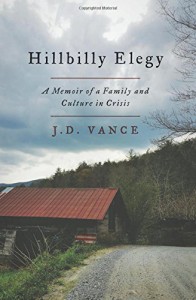 JD Vance grew up as a hillbilly (his own term) with a spiritual home in a Kentucky holler and an actual home (actually, multiple homes due to a peripatetic drug-abusing serially marrying mother) in southwestern Ohio. From these humble origins, he went on to the Marine Corps, a successful undergraduate career, a JD from Yale Law School, and a job at a big law firm. He attributes his success neither to government programs or policy (indeed, he indicts the same on many occasions) nor (thankfully) to his own pluck, brains and pioneering American spirit. Instead, in a nutshell, he posits (to borrow a phrase) that it “takes a village” to raise a child to break the cycle of rustbelt and Appalachian poverty--in his case, he evokes a hillbilly community like his consisting of a pair of fearless engaged grandparents, a heroic sister, and excellent mentors.
JD Vance grew up as a hillbilly (his own term) with a spiritual home in a Kentucky holler and an actual home (actually, multiple homes due to a peripatetic drug-abusing serially marrying mother) in southwestern Ohio. From these humble origins, he went on to the Marine Corps, a successful undergraduate career, a JD from Yale Law School, and a job at a big law firm. He attributes his success neither to government programs or policy (indeed, he indicts the same on many occasions) nor (thankfully) to his own pluck, brains and pioneering American spirit. Instead, in a nutshell, he posits (to borrow a phrase) that it “takes a village” to raise a child to break the cycle of rustbelt and Appalachian poverty--in his case, he evokes a hillbilly community like his consisting of a pair of fearless engaged grandparents, a heroic sister, and excellent mentors.For Vance, the key is that hillbillies (and the poor blacks to whom he frequently compares them) have surrendered a sense of agency -- that anything they may do matters or is effective or is consequential. And this is key: Vance sees them as agents who have surrendered agency, not people from whom agency has been taken by (name your villain) oppression, racism, lack of opportunity, or government programs creating a cycle of laziness.
This is a hard book to like. Putting aside the inevitably smarminess of a 31-year-old writing a memoir and purporting to have answers for the dark, complicated and even byzantine personalities among whom he grew up, and the very selective recourse to certain types of supporting scholarship and research, Vance unearths but does not quite address one theme that seems to animate both him in his success as well as those he left behind: rage. Blinding, inexplicable rage.
His own rage he attributes to a hillbilly ethos and machismo as well as to ACEs (adverse childhood experiences). But rage seems to permeate every character he evokes. That rage may be effective in achieving its short term goals (often pride-based), but often Vance depicts an impotent rage that expresses itself in self-destructive choices; suspicion of media, churches, and other institutions; and hair-trigger violence. Vance continues to experience it even after he has achieved the American dream. It is pervasive and Vance does not really investigate its importance to the hillbilly predicament. How much of this rage is the cause of economic distress (and economic inequality made painfully visible and immediate by television and the media) or its result is not made clear by Hillbilly Elegy.
Vance is clearly smart, clearly driven, and clearly the beneficiary of some lucky breaks and good mentors. He wants to restore agency to hillbilly people -- not entirely blaming them from bad choices but also not relieving them from responsibility. What the book lacks (and perhaps this is too much to ask of a memoir) is a prescription for tempering the rage and fostering the sort of hillbilly community Vance thinks is essential.
My Tender Matador: A Novel
 This novel was a stunning history set in Pinochet's Chile. The main character is queen of her own apartment in Santiago (but to everyone else, a gentleman, a maricon, a pathetic figure). Starstruck by a handsome, educated revolutionary, she permits the Marxists to store boxes of unknown goods in her world. Over time, she develops a close connection with the handsome revolutionary, who proves to be a kind and good person, who appreciates the kindness of the queen. They get drunk, certain events happen, no one mistakes it for true love. Eventually, the revolutionaries launch their attack on Pinochet and nearly kill him, but in the aftermath all must flee.
This novel was a stunning history set in Pinochet's Chile. The main character is queen of her own apartment in Santiago (but to everyone else, a gentleman, a maricon, a pathetic figure). Starstruck by a handsome, educated revolutionary, she permits the Marxists to store boxes of unknown goods in her world. Over time, she develops a close connection with the handsome revolutionary, who proves to be a kind and good person, who appreciates the kindness of the queen. They get drunk, certain events happen, no one mistakes it for true love. Eventually, the revolutionaries launch their attack on Pinochet and nearly kill him, but in the aftermath all must flee.There is so much dignity and innocence in the main character, it made me weep. The author never condescends. This is a wonderful, restrained treatment, imagining both drag queens and Pinochet himself with equal facility. Few are spared.

